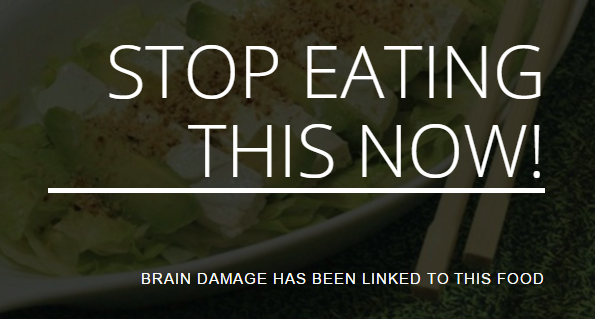
Many health-conscious Americans, in an effort to improve their eating habits, have switched to eating tofu in place of meat or eggs. The soy industry would have you believe that this is a smart move for your heart health, but in reality processed soy, which includes tofu, is not a health food.
You are much better off eating organic eggs, grass-fed meat and raw dairy products than you are eating processed soy. via Viral Alternative News: This “Healthy” Food Can Cause Brain Damage & Breast Cancer. You Should Stop Eating It IMMEDIATELY
Dr. Daniel says that the issue stems from the way that the soybeans are divided into oil and protein in the Western World. Food processors are using high temperatures and pressure, along with petroleum solvents, alkali and acid baths, which release carcinogenic and poison residues making it a harmful and unsafe procedure.
A petition written on 65 pages was sent to the FDA by Dr. Daniel in which he and his colleagues asked them to withdraw the state that `soy prevents heart disease` that was approved in 1999.
We shouldn’t forget that babies and children are still developing and are vulnerable to the effects of soy`s hormone, which means that daily exposure to estrogen-imitating chemicals in children that are soy formulas has been increased by 6-11 times more than in adults who ate any soy food. Also, the blood concentration of the hormones has been increased for 13,000-22,000 times more than estrogen in the blood. Estrogenic equivalent consumed by infants has been equalized up to 5 control pills a day. Therefore, your infants should be fed solely with natural products. Even pregnant women should avoid this food. via This “Healthy” Food Can Cause Brain Damage & Breast Cancer. You Should Stop Eating It IMMEDIATELY
Foods with Tofu Commonly Added:


Top Reasons to Avoid Soy Beans:
- They are loaded with anti-nutrients or so called natural toxins. These anti-nutrients are actually inhibitors that obstruct the secretion of enzymes needed for protein digestion and are not disabled through ordinary cooking. Well, this is very dangerous and it can lead to extensive gastric disease and chronic deficiencies in amino acid intake, causing serious pancreatic damage and even cancer
- Most of the soybeans are GMO and they are loaded with harmful pesticides
- They contain hemaglutinitis, which can lead to blood-clotting
- They contain high amounts of goitrogens, which can lead to decreased thyroid function
- Soy beans contain phytates, which obstruct the absorption of minerals, such as: calcium, iron, zinc and magnesium via healthylifetricks.com
The issue has gotten so bad that Russia just last month banned all imports of U.S. soybeans and corn due to microbial and GMO contamination.
“Restrictions will be imposed on imports starting from February 15,” Assistant Director of the Rosselkhoznadzor, Alexey Alekseenko, said Thursday, adding that “they (the US) have to establish a system to ensure safety of products imported to Russia.”
According to the regulator, the corn imported from the US is often infected with dry rot of maize. In addition, according to the Russian watchdog, corn can be used for transgenic crops in Russia. The potential damage from import and spread of quarantinable objects on the territory of Russia is estimated at 10-15 bln rubles ($126 mln-189 mln) annually.
The Hazards of Soy
In addition to being harmful to our bodies, soy production is harmful to the planet and to livestock who eat it as well. Almost all soybeans grown today are genetically modified and “Round-up ready.” They contain a gene that allows them to be directly sprayed with pesticides without dying.

There is some evidence that this gene can mutate and create a pesticide-like toxin in the body.
Animals who are fed soy can suffer many of the same health consequences as people who consume too much soy, and these harmful properties are then passed on in their meat.
John Robbins reports on a study published in the Journal of the American College of Nutrition. The study, conducted in Hawaii by Lon White, M.D., and his associates, was part of the Honolulu Heart Study. Looking at the diets and the risk of dementia of Japanese men residing in Hawaii, the study found that men who ate the most tofu during their mid-40s to mid-60s were more likely to have dementia and Alzheimer’s as they grew older.
The correlation between tofu and cognitive decline was strong, and could not be explained by confounding factors like age, education, and obesity. In this study, men who had eaten two or more servings of tofu per week in midlife were 2.4 times as likely as men who rarely or never ate tofu to become senile or forgetful by old age. Even the wives of men who ate tofu showed more signs of dementia. White and the other researchers said the brains of the tofu-eaters seemed to have aged more rapidly. By the time the men reached their 80s and 90s, the tofu-eater’s brains seemed to be the equivalent of non-tofu eater’s brains that were five years older.
Concluding Thoughts:
What was once considered a super healthy food has certainly taken a turn for the worse. Having been an avid consumer of soy based products has forced me to find better alternatives. It’s scary to think of the impact food related processing can do to a natural substance.
Other Articles You May Like:
Mindrig Team
Providing you quality content to help Improve your memory, concentration, and focus.


Subscribe To Our Newsletter
Join our mailing list to receive the latest news and updates from our team.








